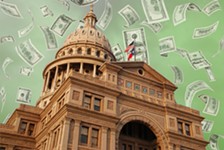Austin's Props A & B Score Easy Victories
The big engine that did
By Mike Clark-Madison, Fri., Nov. 6, 2020
While election night proved a pretty big letdown for a lot of Austin progressives, it started with an impressive triumph. After decades of political struggle and strife, culminating in the most bitter local campaign of the 2020 cycle, Austin voters gave a hearty thumbs-up to Proposition A, the $7.1 billion "initial investment" in the city and Capital Metro's Project Connect long-range transit plan. They then voted even more resoundingly for Proposition B, the $460 million active-mobility bond that aims to make good on long-held plans to build out Austin's sidewalk, bicycle, and urban trail network.
"The overwhelming message is that this is a city that's embracing looking forward into its future," Mayor Steve Adler told the Chronicle on Wednesday. "It's a city that's going to continue pushing for greater innovation, equity, and sustainability." Adler noted that many of the high-profile foes of Propositions A and B have opposed other initiatives he's championed throughout his tenure (the 2016 mobility bond, his own reelection in 2018, the Land Development Code Revision, Convention Center expansion, and Austin FC's new stadium all come to mind). "For the last several elections, we've had the same voices pushing back against progress. But with a new generation moving into the plurality [of voters], I'm excited and proud to be part of a city that embraces its future."
The Prop A campaign raised more than $1 million to persuade the community to back Project Connect, after Austin turned down smaller rail-transit measures in 2000 (narrowly) and 2014 (firmly). In order to go big and catch up to where Austin's transit system would be now if that 2000 plan had been passed, the city asked for voter approval for an 8.5-cent property tax increase, as prescribed by the Texas Legislature in 2019 when it reduced cities' ability to raise taxes without an election. While opponents made much of what they framed as a "25% tax increase" on the city's property tax rate, voters appeared unbothered by what is, in reality, a 4% overall increase in local property tax bills. "The majority [in the Lege] was very clear that they did not oppose cities increasing their tax rates, as long as it was at an election," Adler said. "So I don't anticipate pushback; the people have spoken. I do expect the Lege to have Austin in its sights on other things, but not this."
The work to build out the many projects that make up Project Connect begins immediately, Capital Metro CEO Randy Clarke told us Wednesday. "We've got to hire a lot of people; we've got a big program to deliver here, we have a lot of money to manage correctly, we have real estate and legal tasks," he said. "But we're committed to work toward and deliver on the schedule" laid out in the "initial investment," which would bring the Orange and Blue lines – light rail along North Lamar and South Congress, and out East Riverside to the airport – and the ambitious underground Downtown transit tunnel online by 2030.
Other elements, including the new Red Line station at the Austin FC stadium, new MetroRapid bus lines, and the electrification of Capital Metro's vehicle fleet, are moving ahead much faster, as Cap Metro and the city work together to finalize the joint-venture Austin Transit Partnership to actually build the system. In the interim, Clarke expects that the transit authority's bus service will, once the pandemic is managed, resume what had been 17 straight months of pre-COVID-19 ridership increases, and that Cap Metro may have to add "bridge service" to meet demand before Project Connect is finished. "Through the pandemic, we've been caring about safety as our No. 1 priority and not ridership," he said. "But you look Downtown and there's 40 cranes in the air. There's a good argument that Austin will come out of the pandemic stronger than elsewhere, and I'm very confident that when people are 'back to normal,' they'll be on transit."
Got something to say? The Chronicle welcomes opinion pieces on any topic from the community. Submit yours now at austinchronicle.com/opinion.










